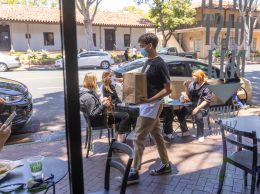With public officials and some health departments beginning to pivot toward re-opening the Tri-Counties for business, there is a single message that stands out — one size fits all won’t work for California.
The state is too big, with too much geography and too much diversity of population density to respond to a single approach.
In San Luis Obispo County, for example, the 142 cases recorded there are low by any metric and they are rising slowly. Indeed, at least 120 of the 142 have recovered and there has been only one death. The Board of Supervisors is already looking at how it might flip the switch on small retail establishments and restaurants, albeit with social distancing and mask wearing as the order of the day.
Ventura County has opened parks and its health department has weighed a plan to allow business operations for up to 10 people. That plan was rescinded given that the governor’s office has strict definitions of what constitutes an essential business.
But for a large county that borders Los Angeles, Ventura County’s 443 cases and 13 deaths put it at the top of its class for containment. And there is reason to think that it would be a perfect location for a pilot project to see what happens if small businesses — the lifeblood of the economy in downtown Oxnard, Ventura, Simi Valley, Thousand Oaks and elsewhere — could actually reopen without causing a spike in positive tests.
Santa Barbara County is a different story, where a hot spot has emerged in Lompoc. An outbreak at the federal penitentiary accounts for roughly 100 or nearly 25 percent of the county’s 430 cases. The county also has a large number of cases among health care workers. Still, there are likely portions of Santa Barbara County where shelter-in-place orders could be modified or where conditions could be set to modify them when the right day arrives.
Lessons learned in San Luis Obispo County could inform Santa Barbara County officials as some restrictions are loosened up.
OUTBREAK AT PRISON DANGEROUS
The significance of the COVID-19 outbreak at the U.S. penitentiary in Lompoc cannot be overstated.
That is because what happens at the prison does not necessarily stay in the prison when it comes to coronavirus. The risk of community spread from the prison population, to guards and health care workers, is too great to take any chances.
That’s why we join Sens. Dianne Feinstein and Kamala Harris, U.S. Rep. Salud Carbajal (D-Santa Barbara) and others in calling for “rapid action to provide medical equipment and care facilities” to meet the health care challenges posed by the outbreak.
We have seen Community Memorial Hospital, a state facility in Atascadero and others deal effectively with institutional outbreaks of COVID-19. It is a travesty to see a federal prison fall so abysmally short of the mark in taking care of inmates, guards, health care workers and, by extension, the general public.






 Print
Print Email
Email

















